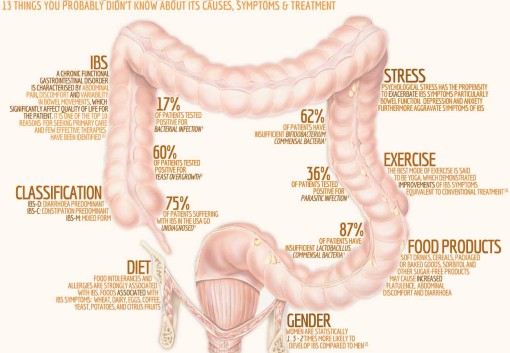Irritable Bowel Syndrome Causes and Management
Do you suspect you have Irritable Bowel Syndrome?
Cramping, bloating, diarrhea and constipation after a good meal raise not just a physical concern but also a social problem. Imagine going on a date with a beautiful girl or nice guy, enjoying a really good dinner and suddenly you begin sweating and just have to go to the bathroom!
This scene reminded me of the movie “Along came Polly” with Ben Stiller as Reuben Feffer and Jennifer Aniston as Polly Prince. They were on a date at an exotic restaurant when Reuben began experiencing abdominal pain and cramps, he began sweating and belching – he had to run to the bathroom! This is a classic case of IBS.
Irritable bowel Syndrome or IBS is a condition of the intestines, particularly the large intestine or the colon. Also called “irritable colon” or simply “irritable bowel”, IBS is a common disorder, affecting most people in their late teens until the early 40’s. It is not a life threatening condition but it can become chronic.
The cause of IBS is not known. It is a functional disorder in which the nerves and intestinal muscles become really sensitive that muscle contraction after eating is exaggerated, causing pain, abdominal cramps and discomfort. Doctors usually base their diagnosis on the symptoms presented by the individual. Other tools to diagnose irritable bowel syndrome include Lower gastrointestinal (GI) series and colonoscopy.
In GI series, an x-ray is used to detect problems in the large intestine.
Colonoscopy, on the other hand, uses a long tube called colonoscope. This tube is inserted into the anus and up the colon to get a view of what might be a possible problem in the large bowel.
IBS presents as abdominal discomfort, cramping, bloating, excess gas, visible abdominal distention and its trademark, alternating constipation and diarrhea.
These symptoms may affect and alter one’s lifestyle significantly. A person with IBS tends to be associated with absenteeism from school or work. Some give up their work and choose to work at home instead. They do not participate much in social activities because of these concerns.
But will IBS totally pull you out from the social scene?
No!
Irritable bowel syndrome may be a long-term condition but there are ways to manage its symptoms.
A change in diet and lifestyle is essential to minimize the problems caused by IBS. People with this disorder are advised to eat healthy and avoid foods that trigger the symptoms. These include fatty foods, caffeinated and carbonated drinks, milk products, chocolate and alcohol.
A healthy diet, which includes an increased amount of fiber-rich foods such as fresh fruits and vegetables, wheat bran, wheat bread and cereals, is the key.
A regular exercise routine should also be established for a person with IBS. Jogging, dog walking, yoga and swimming are some exercises that can help deal with IBS.
IBS is known to worsen with stress, thus it is very important to establish ways to manage stress. Aside from exercise, which reduces tension, a hobby or other social activities could provide a break from stressful situations. Writing on a journal and meditation are some examples to help relieve stress.
Irritable bowel syndrome is not a life-threatening condition. Even with its uncomfortable presentations, it is manageable. A good communication with a healthcare provider is important to achieve individual ways to manage it.

